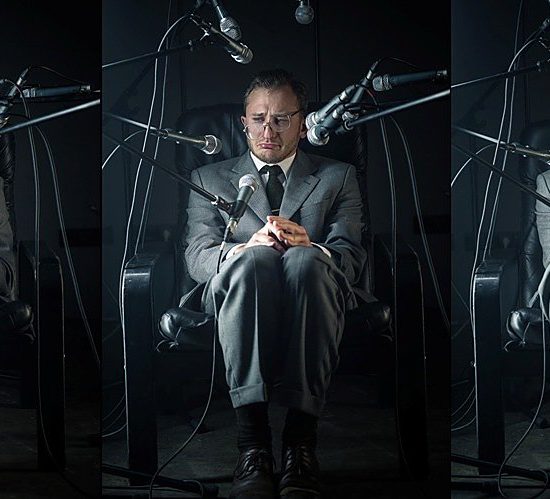Blinded in the swing of life
Theater der Welt/Lithuanian director Oskaras Korsunovas shows “Oedipus the King”
Subconscious discovered by science replaced the divine oracle. The magus of Lithuanian theatre, 33 years old Oskaras Korsunovas, seems not be trusting not only Freud but also the entire modern world. “Oedipus Rex” directed by him opposes every one dimension psychoanalytical requirement which we would expect from a 20-21 centuries child. Antique tragedy as the European premiere was shown in Duisburgh theatre. It was input into the “Theater der Welt” festival and its highlight.
For the whole three hours is Oskaras Korsunovas playing all the registers, he’s exploding the limits of common theatre forms. The choreography and musical elements of dance theatre, the theatre of figures and masks, closeness to a text and the fantasy direction – all that is poured out in a dramatically attractive and clear form. Just towards the end of the performance, when Oedipus becomes a tragic figure recognised in western theatre, it is not only a grotesque story exposure that is paralysed but the audience as well, which tired out but enriched regains its peace of mind.
The very story itself is told in such a merciless sequence as it was done by Sophocles: Oedipus Rex is looking for the one who’s guilty of his city’s sufferings – the plague and other disasters. He doesn’t believe the truth of a blind clairvoyant Teiresias: “The murderer you are looking for are you yourself”. All the arguments, he and his wife and mother Jokasta present in order to prove his innocence, turn against him. There is no human resistance strategy to the divine oracle who foretells that Oedipus will murder his father and will marry his mother. It is the running from the curse that ruins him. At the end of this horrible “get to know yourself” precept Oedipus turns to a weapon and puts his eyes out. When blinded, Oedipus understands the truth unwillingly broken by Teiresias.
Korsunovas combines the Sophocles’ text with rich layers of modern human’s life and culture. He easily bears psychoanalysis putting expressive masks of babies on the heads of an antique chorus and, finally, turning them into a mice nation (Kafka would appreciate it). Rumpled coryphaeus drag himself along the stage as a grumbling Teddy. Clairvoyant Teiresias looks like a long nosed Pinocchio, who turns into a crowing cock. Thus, the motive of truth is varied twice. The one who lends an attentive ear to servant’s news, won’t be far out in hearing the sensation chasing tone, typical of the mass media. When Creon is amicably stretching his hand to lamentable Oedipus, the falseness of this gesture and a cynical lie become obvious.
PETER KLUCKEN



